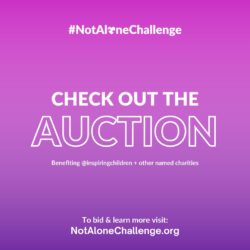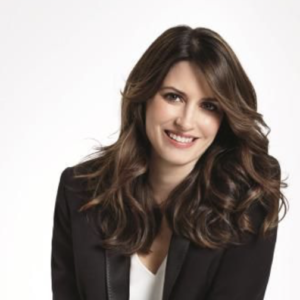“Let’s make this one famous,” Jewel jokes, as she explains how “wildly traumatizing fame was, given that I have incredible social anxiety.” One of her biggest triggers? Being around people. Particularly, strangers.
Or: me.
If the four-time Grammy award nominee still feels that anxiety with new acquaintances, you wouldn’t know it. She’s calm, articulate, kind, and thoughtful, explaining complex mental health issues and their effect on the brain in metaphors that cut through medical-ese and make you quickly go, Oh yes, I get it now.
It’s proof, perhaps, of just how effective the artist’s work in the mental health space has been, which, if you haven’t been paying attention, is vast: She founded the Inspiring Children Foundation (ICF), a nonprofit 10-step program for kids dealing with anxiety and depression, two decades ago; just launched Innerworld, a peer-to-peer mental health app with social support in 3D; and is currently leading the #NotAloneChallenge, a social prompt and auction raising funds to provide free mental health resources to those who don’t have access.
Which unfortunately happens to be a glut of us, considering that 50 percent of America lives in a mental health desert, an area that has no or not enough psychologists, psychiatrists, and counselors. (According to data from the U.S. Department of Health and Human Services, it would take nearly 8,000 more practitioners to fill the need for mental health professionals across the country.)
When Mental Health Attacks
Once upon a time, occasionally homeless and recovering from family trauma, Jewel was living in a personal mental health desert. She was 16 when she started having panic attacks. “I’d never had a panic attack, and I kept having them,” she says, something up to 11 percent of Americans experience every year, with women at twice the risk as men.
Unbeknownst to her then, Jewel employed the principles of cognitive behavioral therapy (CBT) by identifying her triggers—which, experts say, is the first best step to managing and even ending panic attacks. “I collected data: when are they happening, what time of day, where was I,” she says. “This is when I first realized that strangers, or facing something new, were a big trigger for me.”
She also discovered that when two pillars—as she calls big life areas—were shifting at once, she was more prone to attacks. “The fact that I moved to Michigan to go to school and was around only strangers, that was two pillar shifts that caused me to melt down,” she says.
To deal with her panic, Jewel began developing mental health tools “for when I was stimulated.” When you’re filled with anxiety, says Jewel, “your brain goes offline and all the blood goes to the amygdala,” the brain structure whose job it is to assess threats and regulate emotions. “If you make yourself taste something or look at something, your body has to put the blood back into the front lobes to notice that info,” she explains. So she’d imagine herself on a stormy ocean. “It was me on rough water, gray sky, the electrical smell in the air, falling back into the ocean, feeling the sensation, how quiet it would get. I forced my brain to process visual sights.”
This type of visualization exercise is just one of the practice-able tools you can find at notalonechallenge.org, which also includes Jewel’s 10-breath counting method, CBT journaling activities, and book and movie lists to help shift your focus. The #NotAloneChallenge comes at a particularly relevant time: holiday season. In one 2021 survey, three in five Americans said their mental health is negatively impacted by the holidays, with an increase in anxiety, depression, and financial stress. And 64 percent of people with mental illness say the holidays make their conditions worse, per another survey from the National Alliance on Mental Illness (NAMI).
So what does Jewel do during stressful, overwhelming times such as the holidays? Of course, what works for one human doesn’t always work for another, but Jewel likes to have what I call a spiral buddy—a person who is willing and available to talk you down when your triggers start to rear—on speed dial. As Jewel puts it, “I have one friend I really love and trust who knows all the intimate details of my life. I call my friend and I say, Hey, I’m really susceptible, I’m going through a breakup and moving homes, is it ok if I call you?” (During the holidays, can also find emotional refuge in a bathroom: If anybody asks why you’re in there so long, just blame diarrhea—it’ll shut down the convo quick!)
Jewel’s Tools
“The best thing we can focus on is not monoculture,” Jewel says, highlighting, in a way I haven’t heard before, the importance of having coping tools, plural. “Over my 48 years, it’s been about cultivating and developing tools for myself to have a better experience in my body.” And indeed, she seems to have a Mary Poppins-style bag of crap-management tricks, pulling out next a reframe of anxiety itself.
“What if anxiety doesn’t mean something’s wrong with me, but that it’s right?” Jewel suggests. “When I eat something bad, I throw up. What if anxiety is my body’s only way of telling me I’m ‘consuming’ something that I don’t agree with? Like a car alarm. That something I’m consuming in my environment—a thought, feeling, or action—makes me sick.”
This idea came to her over a decade ago, when she was “in real need of real help.” To figure out what exactly was sparking her anxiety, she created sections in her iPhone notes for three categories: what I was thinking, what I was feeling, and what I was doing. It works like this: When you notice you’re uncomfortable, you write down what was going on at the time. You continue this for two weeks before looking at the list comprehensively. “What you basically have are the thoughts, feelings, and actions that make you sick,” she says. “You could realize that it’s a toxic friendship, and you should walk away from it. When you stop making excuses for unhealthy things, you start to get healthier.”
Makes sense, I say, moving on to mantras, as I’m always looking for insightful, non-cheesy sayings that have helped others, and Jewel is very much insightful and non-cheesy. Is there a sentence she repeats to herself when in the throes of a bad moment? Jewel does not indulge. “I don’t like affirmations,” she says plainly. “They’re like little pacifiers to get you through, but they don’t create neurological change. You just worded it in a more palatable way.”
By way of example, she tells me about a fear that would always emerge when doing something new or scary: I don’t know what I’m doing. This thought would quickly send her into a spiral. “I could get myself worked up into a state, and the fact is, it was true,” she says. “I can’t look in the mirror and say I know what I’m doing. It was a lie.” Instead, she started experimenting with what would help, and stumbled upon “the antidote thought,” which for her was this: I won’t quit till I learn. “It almost moves me to tears,” she says, the conviction in her eyes permeating our Zoom screen. “It makes my whole body relax.”
Why? Because it redirects her anxiety into action. She asks herself, What am I doing to learn? And then gets to work doing that very thing. “Our lives change through behavior,” she says. “An idea isn’t enough to change our life. It’s how we act on that idea.” It’s an astute analysis: Several studies show that “attentional bias modification”—a technique that moves attention away from the anxiety-provoking thing onto something else—can help with anxiety disorders. In Jewel’s case, she moves her attention to action.
To work this into your own life, consider another of Jewel’s metaphors. “You can’t eat an elephant,” she says. “You have to start with one bite.” If you’re in talk therapy, she suggests, consider asking your therapist about adding behavioral tasks, with metrics you can both measure so you’ll know when they’re working—or, she adds, when you’re happier.
Happy Is As Happy Does?
It’s a skill the singer believes is learnable, being happier. It seems odd that one could learn an emotion, but Jewel asks that you first ponder the opposite. “Misery is often taught in our family system,” she says. “I had a genetic inheritance that gave me a predisposition to diabetes, and an emotional disposition to addiction, to abuse, to avoidant behaviors, to very specific coping mechanisms.
“I grew up speaking an emotional language that my family has spoken for generations,” she continues. “Can we learn to make an impact on our coping mechanisms? The answer, to a large degree, is yes.” Cultivating happiness, Jewel says, is just like purposely downgrading misery—both involve learning a new emotional language, which is part of IFC’s curriculum, and a skill you can boost through the cognitive behavioral and dialectical tools on Innerworld.
Of course, as with most things in life, it’s a process. “You can’t just get happy,” Jewel responds, when I ask for her secret to letting problems go, something she sings about on “Freewheeling Woman,” her latest album. “It isn’t magical. There is no hack. But there are things that actually work, and I like to focus on one pain point at a time.”
It was, in fact, the first pain point she tackled—shoplifting—that Jewel credits for developing two major things in her life: awareness, and her career. “I became a prolific songwriter,” she says, “because I was a prolific thief.”
As a teenager, she first began stealing for survival. But she soon moved beyond food and onto “bathing suits and anything. It became a real addiction,” she says. “It made me feel powerful and cared for. I couldn’t just do without it. I had to spend a lot of time examining it. I stumbled upon one of the most profound things because of my stealing. I had to cultivate awareness.”
She continues. “First, I woke up after I stole. Then I woke up while I was stealing. Then I woke up before, but I couldn’t stop. The very last thing was I was stimulated to steal but I replaced the behavior with writing.” When she got the urge to steal, she’d pick up a pen instead. “By changing one behavior, just the stealing, I got a very important thing to shift in my life,” she says. “I became a writer.”
And because she’s a writer, Jewel says, “I’m fascinated by words and definitions.” Throughout our chat, a number of much-bandied-about wellness terms come up, and Jewel’s got a particular take on each. As another famous thinker, Albert Einstein, once said, “Peace cannot be kept by force; it can only be achieved by understanding.” Thanks to Jewel’s way with words, her understanding widens our perceptions. With that, I’ll leave you with…
Jewel’s Mental Health Glossary
Awareness
“Awareness helps people get out of knee-jerk reactions and get to thoughtful responses. It’s like getting the car off of autopilot and getting it into neutral. Neutral gets you into a position to get yourself in a new direction. Let’s say I’m really upset. When our brain is on autopilot, we don’t pause, and we have a knee-jerk reaction. I cuss out my boyfriend with the same result over and over; it’s self-defeating. Then you pause and go, I don’t want to have a knee-jerk reaction. So if I notice I’m upset, can I stop and pause and not react? Everything in my body is making me want to cuss this person, but I’m going to remove myself—just sit in the corner and wish I could cuss that person out [but not do it]. That’s a very powerful thing. Your body will calm down. You might breathe, which speeds up the process. [Then you can] form a thoughtful response.”
Resilience
“Resilience in my mind means multiple tools. An ecosystem is resilient because it’s biodiverse. There are plants that thrive when it’s a drought, there are other plants that thrive [with lots of rain]. There are things that help a forest to overcome diversity. Nature’s throwing things at us all the time. Different emotional weather. Sometimes it’s a drought—we’re lonely. And other times it’s a flood—there are too many people. Somebody is resilient when they have multiple tools to handle multiple situations.”
Mindfulness
“Mindfulness is learning to be consciously present in real time so I can observe [what I’m feeling]. Being consciously present won’t change your life, but it will put you in a position to change your life. If your body is a car, your brain is the steering wheel, but it can go on autopilot. Descarte said, I think, therefore I am. But I believe it’s, I perceive what I think, therefore I am. You’re the observer of [your sadness]. If you can perceive you’re happy or excited, you can be. You’re the observer of those states. They come and they go. One of the key things for me was realizing I needed a much stronger relationship with the observer and not with the brain. The brain is a tool.”
Meditation
“Meditation is a bicep curl for becoming present. We want to learn to be present for longer periods of time so we can form thoughtful responses that can lead to change—not having to apologize to a child because I lost it, not getting in the same type of crappy relationship with the same type of crappy person. So that when I’m angry, instead of picking up the [metaphorical] hammer, I have a screwdriver, and I’m gonna use that to do something different.
“If you have a hard time meditating, what I want people to do: Breathe in is 1, breathe out is 2, breathing in is 3. Next thing, I’m thinking about my job and I don’t know how many breaths went by. When you notice that, that was one bicep curl. If you meditate for five minutes and get distracted 100 times and you come back 100 times, you did 100 reps. A lot of people have meditation backward—they think they have to have no thoughts. You‘re not failing if you have thoughts. Winning is actually being lost in thought and coming back. The more you come back, the more you’re neurologically training your brain to thoughtfully respond. That muscle kicks in. We live in a world that has profited on distraction—how to keep us distracted and engaged in any number of things. A true activist is saying, I refuse to be distracted. I’m going to form a more nourishing response.”
To participate in the #NotAloneChallenge to help people who are struggling during the holiday season, post a 30-second social video sharing your own mental health issues or reminding people they’re not alone, using the hashtag and tagging @jewel and @iheartradio.

You can also find resources to deal with holiday worries—or bid on charitable auction items from Jewel (a custom song) and other celebrities (how about an Atari Pong match with Steve Wozniak?)—at notalonechallenge.org.
Geek Out on Our Sources
Mental Health Deserts (1): https://abcnews.go.com/Health/americas-mental-health-care-deserts-hard-access-care/story?id=84301748
Mental Health Deserts (2): https://www.ruralhealthinfo.org/topics/mental-health
Panic Attacks: https://my.clevelandclinic.org/health/diseases/4451-panic-disorder
NAMI Survey (1): https://namica.org/blog/handling-stress-during-the-holiday-season/
NAMI Survey (2): https://nami.org/Press-Media/Press-Releases/2014/Mental-health-and-the-holiday-blues
Holiday Stress Survey: https://sesamecare.com/blog/lowering-holiday-stress-2021
Amygdala information: https://www.simplypsychology.org/amygdala.html
Attentional Bias Modification: https://www.apa.org/monitor/2011/11/behavior-change
Einstein Quote: https://www.brainyquote.com/topics/understanding-quotes





